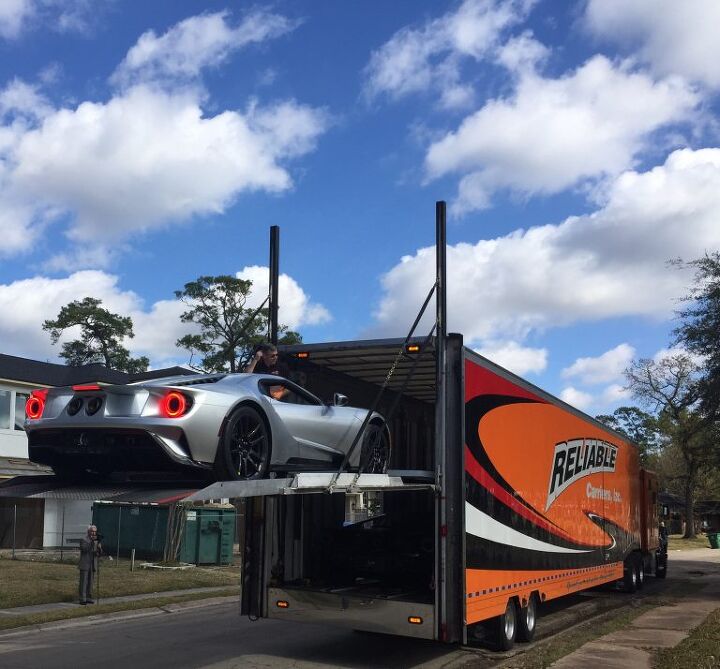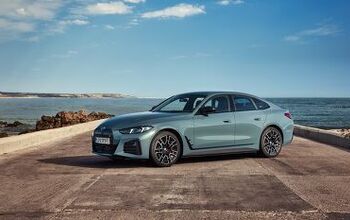TTAC's Ford GT: Oneself Versus the Self

It happened: TTAC’s Ford GT arrived.
And the moment felt extra special because it isn’t a foreign exotic — it’s an American Supercar evoking a rich branding history buried deep within many of us. I reckon every GT delivery is loaded with Ford-centric stories involving family, friends and passersby.
Because my first car was a Ford deemed impressive by my public school classmates: a triple black hardtop Galaxie on beefy 15×8″ chrome smoothies. It was even cooler knowing the backstory of my Godfather giving it to me, but whatever — it was just a cool ride for a dorky outcast.
Yet it forced me to question everyone’s newfound excitement when no such interest existed beforehand. All the attention was…shocking.
That attention came back: combining years of prolonging answers to questions from friends/folks on social media with the execution of Ford’s brilliant influencer marketing ecosystem, TTAC’s GT definitely revisits the schoolyard hype around my Galaxie.
But the older, wiser me seeks to appreciate cars on merits alone. No deeper implications for one’s ego. Which is quite the conversation killer, drawing stares of disbelief whenever asked about any form of aspirational transportation.
The Ford GT delivery changes nothing, with a percussive Richard Spaven joint stuck on repeat in my head:
We’re all equal
The longer-than-expected wait thankfully netted an allocation for the rarer Carbon Series: a generous gesture from the folks in Dearborn.
This version is about 40 lbs lighter thanks to standard carbon fiber wheels, titanium lug nuts and exhaust tubes (with a deeper tone than the base system) and an extra-ventilated engine cover. Oh, and more carbon fiber bits, including those (cliché) racing stripes…that you cannot delete on this package.
Never intended to be subtle, when finished in Ingot Silver sans orange accents (peep them on Google Image Search) the Ford GT Carbon Series is relatively calm and collected.
Perhaps a full road test (and Vellum Venom) has merit. But after all the digital ink spilled since we started this journey, what’s left to say?
You tell me.
Because if you don’t, I’ll include the Pilot Fish with TTAC’s Silver Shark: 30 years separate these cutting-edge V6 Flagship Fords, but the similarities go beyond their seemingly-inappropriate engine choices. Yes, compared to their V8-blessed (4.5L Cadillac DeVille, McLaren 720s) competition, both are 10 percent-ish short on horsepower. Yet both possess cutting edge, unique(ish) engineering that’s immensely rewarding to experience.
What’s the great reward? For starters, having the Pilot Fish at delivery was entertaining and satisfyingly relevant: one attendee arrived in an FD Mazda RX-7, and totally understood my madness after comparing the Pilot Fish to a Mazda 929. He quickly regaled us with the merits of a 929 from his past, including Mazda’s cool oscillating vents.
We are all equal. But some are more equal — see how peeps following me on Instagram responded to this question:
Hopefully this was the most bizarre Ford GT delivery you’ve seen on the Internet… and now you’re gonna help TTAC write the next twisted chapter.
[Images: © 2019 Sajeev Mehta/The Truth About Cars]

More by Sajeev Mehta
Latest Car Reviews
Read moreLatest Product Reviews
Read moreRecent Comments
- W Conrad I'm not afraid of them, but they aren't needed for everyone or everywhere. Long haul and highway driving sure, but in the city, nope.
- Jalop1991 In a manner similar to PHEV being the correct answer, I declare RPVs to be the correct answer here.We're doing it with certain aircraft; why not with cars on the ground, using hardware and tools like Telsa's "FSD" or GM's "SuperCruise" as the base?Take the local Uber driver out of the car, and put him in a professional centralized environment from where he drives me around. The system and the individual car can have awareness as well as gates, but he's responsible for the driving.Put the tech into my car, and let me buy it as needed. I need someone else to drive me home; hit the button and voila, I've hired a driver for the moment. I don't want to drive 11 hours to my vacation spot; hire the remote pilot for that. When I get there, I have my car and he's still at his normal location, piloting cars for other people.The system would allow for driver rest period, like what's required for truckers, so I might end up with multiple people driving me to the coast. I don't care. And they don't have to be physically with me, therefore they can be way cheaper.Charge taxi-type per-mile rates. For long drives, offer per-trip rates. Offer subscriptions, including miles/hours. Whatever.(And for grins, dress the remote pilots all as Johnnie.)Start this out with big rigs. Take the trucker away from the long haul driving, and let him be there for emergencies and the short haul parts of the trip.And in a manner similar to PHEVs being discredited, I fully expect to be razzed for this brilliant idea (not unlike how Alan Kay wasn't recognized until many many years later for his Dynabook vision).
- B-BodyBuick84 Not afraid of AV's as I highly doubt they will ever be %100 viable for our roads. Stop-and-go downtown city or rush hour highway traffic? I can see that, but otherwise there's simply too many variables. Bad weather conditions, faded road lines or markings, reflective surfaces with glare, etc. There's also the issue of cultural norms. About a decade ago there was actually an online test called 'The Morality Machine' one could do online where you were in control of an AV and choose what action to take when a crash was inevitable. I think something like 2.5 million people across the world participated? For example, do you hit and most likely kill the elderly couple strolling across the crosswalk or crash the vehicle into a cement barrier and almost certainly cause the death of the vehicle occupants? What if it's a parent and child? In N. America 98% of people choose to hit the elderly couple and save themselves while in Asia, the exact opposite happened where 98% choose to hit the parent and child. Why? Cultural differences. Asia puts a lot of emphasis on respecting their elderly while N. America has a culture of 'save/ protect the children'. Are these AV's going to respect that culture? Is a VW Jetta or Buick Envision AV going to have different programming depending on whether it's sold in Canada or Taiwan? how's that going to effect legislation and legal battles when a crash inevitibly does happen? These are the true barriers to mass AV adoption, and in the 10 years since that test came out, there has been zero answers or progress on this matter. So no, I'm not afraid of AV's simply because with the exception of a few specific situations, most avenues are going to prove to be a dead-end for automakers.
- Mike Bradley Autonomous cars were developed in Silicon Valley. For new products there, the standard business plan is to put a barely-functioning product on the market right away and wait for the early-adopter customers to find the flaws. That's exactly what's happened. Detroit's plan is pretty much the opposite, but Detroit isn't developing this product. That's why dealers, for instance, haven't been trained in the cars.
- Dartman https://apnews.com/article/artificial-intelligence-fighter-jets-air-force-6a1100c96a73ca9b7f41cbd6a2753fdaAutonomous/Ai is here now. The question is implementation and acceptance.





































Comments
Join the conversation
So what was the logic of getting such a fine car delivered to a lower middle class neighborhood anyways? Show off to the plebs? Photo op against the dumpster? Put the guy with the vette down the street on notice their is a new boss in town? Your gated community doesn't allow semis? Damn that thing is sexy. I hate you.
Tres cool, for both you and your brother! Enjoy!